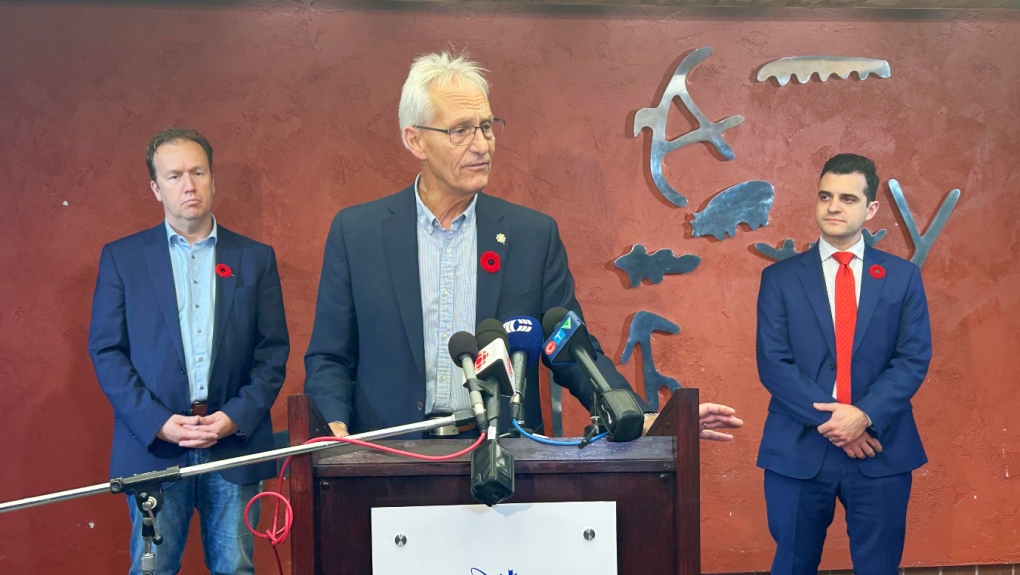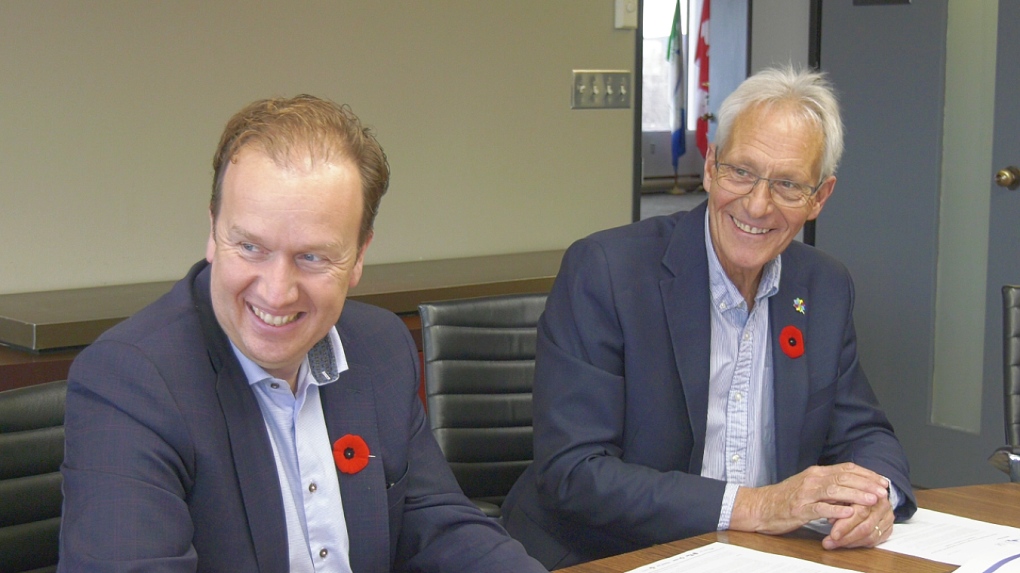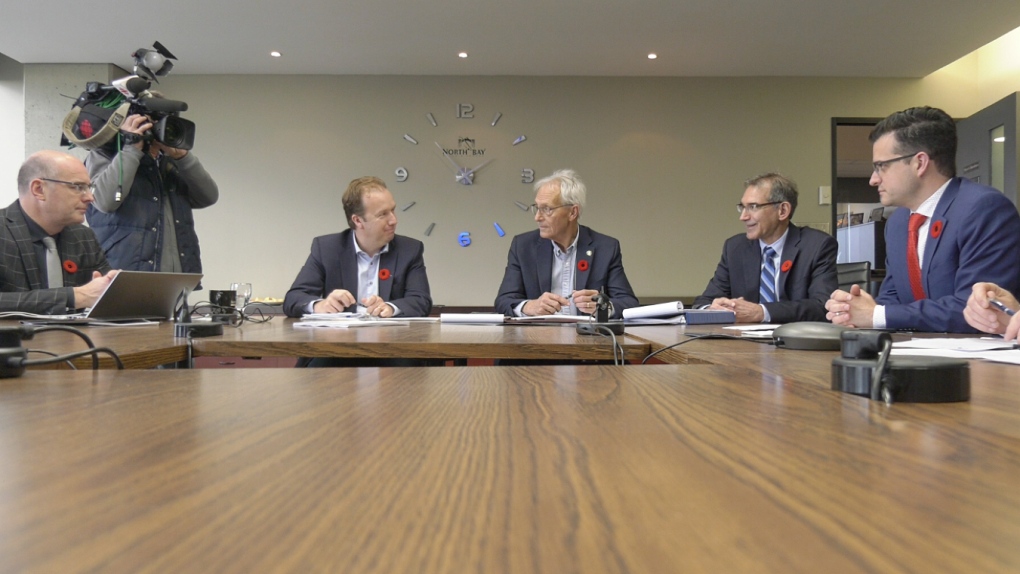Northern Ont. mayors call for help with homelessness, addictions and immigration
Mayors of the five largest cities in northern Ontario met in North Bay the last two days to discuss a range of critical issues impacting their cities and the region.
The mayors of Sudbury, Timmins, Sault Ste. Marie, North Bay and Thunder Bay said that building relationships with the provincial and federal governments remains at the top of the agenda when it comes to tackling homelessness and immigration priorities for the north.
 The mayors of Sudbury, Timmins, Sault Ste. Marie, North Bay and Thunder Bay said that building relationships with the provincial and federal governments remains at the top of the agenda when it comes to tackling homelessness and immigration priorities for the north. (Eric Taschner/CTV News)
The mayors of Sudbury, Timmins, Sault Ste. Marie, North Bay and Thunder Bay said that building relationships with the provincial and federal governments remains at the top of the agenda when it comes to tackling homelessness and immigration priorities for the north. (Eric Taschner/CTV News)
Flanked by colleagues from Sudbury and Sault Ste. Marie, North Bay Mayor Peter Chirico said he is putting his foot down -- severe challenges in northern Ontario need to be solved now with help from upper levels of government.
"To make sure our citizens and our entire population in northern Ontario are well serviced," Chirico told reporters Friday.
One of the top priorities is pushing the Ontario government to make sure there's a dedicated homelessness and addiction recovery treatment (HART) hub in each major city in the north.
The Ford government recently announced that 19 HART hubs would be put in place across the province at the cost of $378 million.
Ten new hubs will be built, while the other nine others will be created by converting former safe consumption sites.
The hubs are meant to connect people with complex homelessness, mental health and addiction challenges to a "comprehensive locally based approach to treatment that will offer an array of services."
 The mayors of Sudbury, Timmins, Sault Ste. Marie, North Bay and Thunder Bay said that building relationships with the provincial and federal governments remains at the top of the agenda when it comes to tackling homelessness and immigration priorities for the north. (Eric Taschner/CTV News)
The mayors of Sudbury, Timmins, Sault Ste. Marie, North Bay and Thunder Bay said that building relationships with the provincial and federal governments remains at the top of the agenda when it comes to tackling homelessness and immigration priorities for the north. (Eric Taschner/CTV News)
 The mayors of Sudbury, Timmins, Sault Ste. Marie, North Bay and Thunder Bay said that building relationships with the provincial and federal governments remains at the top of the agenda when it comes to tackling homelessness and immigration priorities for the north. (Eric Taschner/CTV News)
The mayors of Sudbury, Timmins, Sault Ste. Marie, North Bay and Thunder Bay said that building relationships with the provincial and federal governments remains at the top of the agenda when it comes to tackling homelessness and immigration priorities for the north. (Eric Taschner/CTV News)
"They’ve made it easy for us. This is what we have available, and this is what we’re going after," said Sault Mayor Matthew Shoemaker.
Statistics show the five major cities in the north have the highest opioid mortality rates in the province and are facing the challenge with little support from the province.
"The further you get away from Queen’s Park, the more dire the situation becomes," Shoemaker said.
"I think the fact that it’s not happening at the door at Queen’s Park makes it less visible."
The mayors are also calling for an expedited launch of the Rural Community Immigration Pilot and to make it permanent to address regional labour shortages.
The strategy, the mayors said, aligns with their broader vision of a where economic opportunity, public safety and quality of life coexist in the north.
Immigration fight
That fight is going to be with the federal government, which is cutting the number of permanent immigrants by at least 20 per cent from its previous target of 500,000.
"Let’s not paint the entire country with one brush," said Chirico.
"(In) the large urban centres, it is out of control, but in rural and northern Canada, that’s not the case."
A big problem is that cities often have to compete with each other because of the limited funding to tackle these challenges.
- Download the CTV News app now
- Get local breaking news alerts
- Daily newsletter with the top local stories emailed to your inbox
"The needs are just not our municipality. It's the regions that we have, as well. That's kind of the unique difference between northern and southern Ontario," said Sudbury Mayor Paul Lefebvre.
"You can drive an hour and you can get services … in ways that they want. We don't have that luxury here.”
The path forward, the mayors said, is simple. They plan to send their concerns to their provincial and federal representatives, as well as reach out to ministers who work with addictions, mental health and immigration to have their voices heard.
"To help northern Ontario thrive, we need stronger social programs to tackle the opioid crisis and a focus on job growth," Timmins Maor Michelle Boileau said in a statement.
"By investing in our people and safety, we’re setting up Timmins and the entire north for a healthier, more prosperous future."
A draft of their proposal will also be sent to Ontario Premier Doug Ford’s office.
CTVNews.ca Top Stories

Donald Trump says he urged Wayne Gretzky to run for prime minister in Christmas visit
U.S. president-elect Donald Trump says he told Canadian hockey legend Wayne Gretzky he should run for prime minister during a Christmas visit but adds that the athlete declined interest in politics.
Historical mysteries solved by science in 2024
This year, scientists were able to pull back the curtain on mysteries surrounding figures across history, both known and unknown, to reveal more about their unique stories.
King Charles III focuses Christmas message on healthcare workers in year marked by royal illnesses
King Charles III used his annual Christmas message Wednesday to hail the selflessness of those who have cared for him and the Princess of Wales this year, after both were diagnosed with cancer.
Mother-daughter duo pursuing university dreams at the same time
For one University of Windsor student, what is typically a chance to gain independence from her parents has become a chance to spend more time with her biggest cheerleader — her mom.
Thousands without power on Christmas as winds, rain continue in B.C. coastal areas
Thousands of people in British Columbia are without power on Christmas Day as ongoing rainfall and strong winds collapse power lines, disrupt travel and toss around holiday decorations.
Ho! Ho! HOLY that's cold! Montreal boogie boarder in Santa suit hits St. Lawrence waters
Montreal body surfer Carlos Hebert-Plante boogie boards all year round, and donned a Santa Claus suit to hit the water on Christmas Day in -14 degree Celsius weather.
Canadian activist accuses Hong Kong of meddling, but is proud of reward for arrest
A Vancouver-based activist is accusing Hong Kong authorities of meddling in Canada’s internal affairs after police in the Chinese territory issued a warrant for his arrest.
New York taxi driver hits 6 pedestrians, 3 taken to hospital, police say
A taxicab hit six pedestrians in midtown Manhattan on Wednesday, police said, with three people — including a 9-year-old boy — transported to hospitals for their injuries.
Azerbaijani airliner crashes in Kazakhstan, killing 38 with 29 survivors, officials say
An Azerbaijani airliner with 67 people onboard crashed Wednesday near the Kazakhstani city of Aktau, killing 38 people and leaving 29 survivors, a Kazakh official said.

































